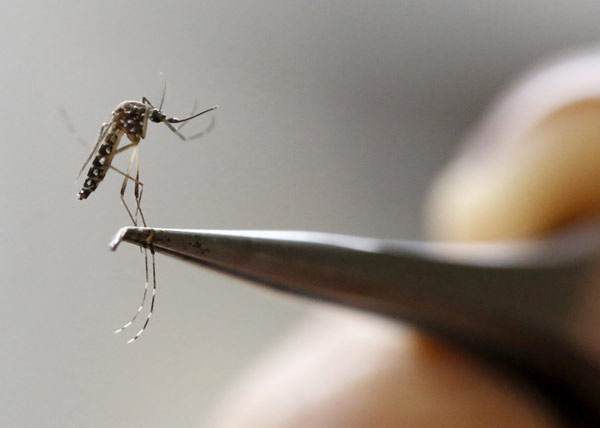Zika curbs to include mosquito mass extermination
Updated: 2016-02-04 07:44
By Shan Juan(China Daily)
|
||||||||
 |
|
A mosquito is seen in a lab of the International Training and Medical Research Training Center in Cali, Colombia, on Tuesday. [Photo/Agencies] |
National authority will issue guidelines on controlling virus
As the weather turns warmer and China faces a higher risk of local transmission of the Zika virus, the top virus-prevention authority plans a large-scale extermination of mosquitoes, particularly in South China, to cut off transmission of the virus and curb its spread here, a senior virologist said on Wednesday.
Li Dexin, head of the National Institute for Viral Disease Control and Prevention, made the remarks as the health authority prepared to issue guidelines on Thursday for the treatment and control of the mosquito-borne virus.
Warm conditions and increasing rain help Aedes aegypti mosquitoes thrive, Li said. These mosquitoes transmit Zika to humans and thus increase the possibility of transmission in China, he added.
In response, the health authority might carry out a yearly mosquito mass-extermination campaign, usually in April or May, to contain the mosquitoes, he said.
The Zika-spreading mosquito has long been a dominant breed in South China, said Guo Yuhong, a researcher at the Infectious Disease Institute of the Chinese Center for Disease Control and Prevention.
According to Guo, Zika-infected mosquitoes can infect people they bite and pass on the virus to the next generation of mosquitoes as well.
Furthermore, infected people can in turn pass the virus to Zika-free mosquitoes that bite them, and these mosquitoes then spread the virus to yet more humans.
"So the current control priority is to prevent imported Zika virus, either in humans or mosquitoes from the affected areas," said LiDexin.
Zika screening tools have been distributed to all provincial-level centers for disease control and important ports of entry nationwide to help detect potential infections.
"It can show results in two to three hours, and we've conducted training for workers," he added.
On the clinical side, medics are required to closely watch for symptoms of Zika infection and to ask for the travel history of people with suspected cases, he said.
Li emphasized, however, that most people infected with Zika develop mild symptoms and recover quickly.
"The most important thing is to quarantine them from the mosquitoes," he said.
About 80 percent of infected humans show no symptoms, but "they could still spread the virus to mosquitoes that bite them", he added.
The issue of most concern, experts said, is the possible link between Zika infection and microcephaly, a condition in newborns marked by abnormally small heads and brains that have not developed properly.
Li suggested that pregnant women or those who plan to become pregnant should not go to affected areas.
China has reported microcephaly cases before, but they were caused by other factors such as other viruses or exposure to radiation, he said.
To enhance Zika research, Li said China is now in contact with the United States Centers for Disease Control and Prevention, aiming to bring in virus samples for laboratory use.
shanjuan@chinadaily.com.cn
- Australian police suspect overseas hackers behind threats to schools
- EU reform proposals show 'real progress': British PM
- Mainland Chile confirms first 3 cases of Zika virus
- Lanterns decorate temple to celebrate Chinese New Year in Kuala Lumpur
- Tusk to publish proposal for UK-EU settlement
- Cuba's Castro pays historic visit to France

 China's 'Moon Walker' sends back stunning HD photos
China's 'Moon Walker' sends back stunning HD photos
 Starbucks, office rents and CEOs form alternative outlook on China
Starbucks, office rents and CEOs form alternative outlook on China
 China's most beautiful wetlands
China's most beautiful wetlands
 Premier Li takes Spring Festival greetings, and gifts, to old folk
Premier Li takes Spring Festival greetings, and gifts, to old folk
 International friendship blossoms in peony painting
International friendship blossoms in peony painting
 Culture Insider: Little New Year
Culture Insider: Little New Year
 Global celebrations mark Chinese New Year
Global celebrations mark Chinese New Year
 Motorcycles ride home for Spring Festival reunion
Motorcycles ride home for Spring Festival reunion
Most Viewed
Editor's Picks

|

|

|

|

|

|
Today's Top News
National Art Museum showing 400 puppets in new exhibition
Finest Chinese porcelains expected to fetch over $28 million
Monkey portraits by Chinese ink painting masters
Beijing's movie fans in for new experience
Obama to deliver final State of the Union speech
Shooting rampage at US social services agency leaves 14 dead
Chinese bargain hunters are changing the retail game
Chinese president arrives in Turkey for G20 summit
US Weekly

|

|








